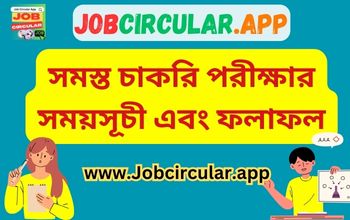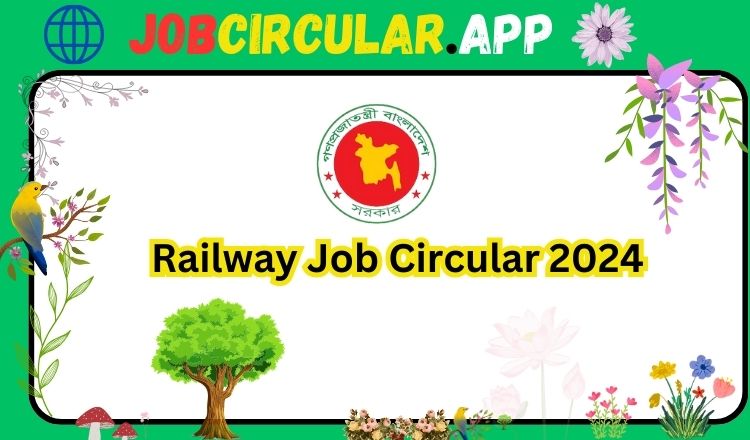BD Job Circulars

Navigating the Job Market: A Comprehensive Guide to BD Job Circulars
The job market can be an overwhelming and confusing place. Job seekers are often bombarded with a variety of job circulars from different companies, all with different requirements and qualifications. It can be difficult to know where to start and how to navigate through this sea of information. This is where this comprehensive guide comes in. In this post, we will be focusing on BD job circulars, offering job seekers a comprehensive guide to understanding and navigating the job market. We’ll cover everything from how to find the right job circulars, to understanding the job requirements and qualifications, and how to craft the perfect application. With this guide, you’ll be able to stay ahead of the competition and land the job of your dreams.

1. Introduction to BD Job Circulars
BD Job Circulars are an integral part of the job market in Bangladesh. These circulars serve as a roadmap for individuals seeking employment opportunities and businesses looking to hire talented professionals. In this comprehensive guide, we will delve into the world of BD Job Circulars, exploring their significance, purpose, and how to navigate through them effectively.
Job circulars are essentially notifications or advertisements released by various organizations, both in the public and private sectors, to announce job vacancies. These circulars provide detailed information about the available positions, including job titles, responsibilities, qualifications, and application procedures.
The job market in Bangladesh is highly competitive, with a large number of job seekers vying for limited job opportunities. BD Job Circulars play a crucial role in connecting job seekers with potential employers, facilitating the recruitment process for both parties.
For job seekers, these circulars serve as a valuable source of information, offering insights into the current job market trends, industry requirements, and available job opportunities. They provide a platform for individuals to explore different career paths, identify suitable positions, and apply accordingly.
Employers, on the other hand, rely on job circulars to attract qualified candidates for their organizations. These circulars allow employers to reach a wide pool of potential applicants and effectively communicate their job requirements and expectations.
Navigating through BD Job Circulars can be overwhelming, considering the multitude of circulars released by various organizations. However, with the right strategies and tools, job seekers can streamline their job search process and increase their chances of securing their desired positions.
In the following sections of this guide, we will discuss essential tips and techniques for effectively navigating BD Job Circulars. From understanding the components of a job circular to crafting an impressive application, we will equip you with the knowledge and skills necessary to stand out in the competitive job market.
Whether you are a fresh graduate, an experienced professional, or someone looking to switch careers, this guide will serve as your comprehensive resource to navigate the world of BD Job Circulars and embark on a successful job search journey. So, let’s dive in and unlock the doors to exciting career opportunities!
2. Understanding the job market in Bangladesh
Understanding the job market in Bangladesh is crucial when navigating through the sea of BD job circulars. With a rapidly growing economy and a population of over 160 million people, Bangladesh offers a diverse range of job opportunities across various industries.
One of the key factors to consider is the dominant sectors in the country. Bangladesh is known for its thriving garments and textile industry, which employs a significant portion of the workforce. Other major industries include agriculture, pharmaceuticals, IT and software development, banking and finance, telecommunications, and manufacturing.
It is important to note that the job market in Bangladesh is highly competitive. With a large number of skilled individuals graduating from universities each year, job seekers must possess relevant qualifications and skills to stand out from the crowd. Additionally, having a strong network and connections within the industry can significantly enhance job prospects.
Furthermore, it is essential to be aware of the cultural and societal norms in Bangladesh when exploring job opportunities. Understanding the local customs, etiquette, and language can give job seekers a competitive edge and help them navigate through the job market more effectively.
Keeping up with the latest trends and developments in the job market is also crucial. This includes staying informed about new industries emerging in Bangladesh, government initiatives, and technological advancements that may influence job prospects.
By having a comprehensive understanding of the job market in Bangladesh, job seekers can tailor their approach, identify potential opportunities, and effectively leverage job circulars to their advantage.
3. Benefits of job circulars
Job circulars are an essential tool for job seekers navigating the competitive job market. These circulars provide a wealth of benefits that can significantly enhance your job search and ultimately lead to a successful career.
First and foremost, job circulars offer a centralized platform where employers advertise their job openings. This means that you can access a wide range of job opportunities from various industries and sectors, all in one place. Whether you’re looking for entry-level positions or senior management roles, job circulars provide a comprehensive list of available jobs, ensuring that you don’t miss out on any potential opportunities.
Furthermore, job circulars often include detailed job descriptions and requirements. This enables you to gain a clear understanding of the skills, qualifications, and experience that employers are seeking. By carefully reviewing these job requirements, you can tailor your application and highlight your relevant strengths, increasing your chances of securing an interview.
In addition, job circulars often provide valuable information about the company or organization offering the job. This allows you to research and assess the company’s values, culture, and reputation before applying. Understanding the company’s background and work environment can help you determine if it aligns with your career goals and aspirations.
Another significant benefit of job circulars is the potential for networking opportunities. Many job circulars include contact information for the hiring manager or HR department. This presents an opportunity to reach out proactively, express your interest, and establish a connection. Networking can often give you an advantage over other candidates and may even lead to unpublished job opportunities within the organization.
Lastly, job circulars can provide insights into the current job market trends and demands. By regularly reviewing these circulars, you can stay updated on emerging industries, in-demand skills, and market demands. This knowledge can guide your career decisions, such as upskilling or pursuing additional education, to enhance your marketability and stay competitive in the job market.
In conclusion, job circulars offer numerous benefits that can greatly support your job search efforts. From providing a centralized platform for job opportunities to offering valuable insights and networking possibilities, leveraging job circulars can significantly increase your chances of securing your desired position and navigating the job market successfully.
4. Where to find BD job circulars
When it comes to finding job circulars in Bangladesh, there are several reliable sources you can turn to. These platforms provide a wide range of opportunities across various industries, helping you stay updated with the latest job openings. Here are some of the best places to find BD job circulars:
1. Online Job Portals: Websites like bdjobs.com, chakri.com, and prothomalojobs.com are popular platforms that aggregate job postings from different companies and organizations. These portals allow you to search for jobs based on your preferred criteria, such as location, industry, and experience level.
2. Company Websites: Many companies in Bangladesh advertise their job vacancies directly on their official websites. It’s a good idea to regularly check the career or job section of the companies you’re interested in working for. This will give you a direct insight into the positions available and the application process.
3. Social Media: Social media platforms like LinkedIn, Facebook, and Twitter have become valuable resources for job seekers. Companies often share their job openings on these platforms, allowing you to easily find and apply for relevant positions. Joining professional groups and following industry-specific pages can also provide you with access to exclusive job opportunities.
4. Newspapers and Magazines: Traditional media outlets such as newspapers and magazines still play a significant role in job advertisements. Publications like The Daily Star, Prothom Alo, and The Financial Express have dedicated sections for job circulars. Keep an eye on these publications, especially on specific days when they feature job listings.
5. Networking: Building a strong professional network can greatly enhance your job search. Attend industry events, career fairs, and seminars where you can connect with professionals in your field. Often, job vacancies are shared through word of mouth or referrals within professional networks.
Remember to regularly check these sources as job circulars are frequently updated. Additionally, consider setting up job alerts or subscribing to newsletters to receive notifications about new opportunities. By utilizing these resources, you’ll be well on your way to finding relevant job circulars and navigating the job market in Bangladesh successfully.
5. Analyzing job circular requirements
Analyzing job circular requirements is a crucial step in navigating the job market successfully. Each job circular comes with a set of requirements and qualifications that candidates must meet to be considered for the position. By carefully analyzing these requirements, you can tailor your application to highlight your strengths and increase your chances of standing out among other applicants.
Start by thoroughly reading the job circular and understanding the specific skills, experience, and qualifications sought by the employer. Take note of keywords or phrases that are repeated throughout the requirements section. These keywords often indicate the core competencies and qualifications that the hiring manager is looking for.
Next, evaluate your own skills and experiences in relation to the job requirements. Identify areas where you align with the desired qualifications and make a list of specific examples or achievements that demonstrate your proficiency in those areas. This will help you craft a compelling resume and cover letter that directly address the employer’s needs.
It is important to note that while you should strive to meet as many of the job requirements as possible, you don’t have to fulfill every single one. Job requirements are often a wish list, and employers understand that not every candidate will possess every desired qualification. Focus on showcasing your strengths and transferable skills that make you a valuable asset to the company.
Additionally, don’t overlook the importance of soft skills. While technical skills and qualifications are essential, employers also value attributes such as communication, teamwork, problem-solving, and adaptability. Highlight these skills in your application and provide specific examples of how you have demonstrated them in previous roles or experiences.
By carefully analyzing job circular requirements and aligning them with your own skills and experiences, you can position yourself as a strong candidate for the position. This level of attention to detail and customization will show employers that you are genuinely interested in the role and are willing to put in the effort to meet their needs.
6. Tailoring your resume and cover letter for job circulars
When it comes to applying for job circulars, one size does not fit all. Each job circular is unique, with specific requirements and qualifications. To increase your chances of getting noticed by recruiters, it is essential to tailor your resume and cover letter to match the job requirements.
Start by carefully reading the job circular and highlighting the key skills and qualifications they are looking for. Make a list of these requirements and compare them with your own skills and experiences. Identify the areas where you align with the job requirements and focus on highlighting these in your application.
When updating your resume, make sure to include relevant keywords and phrases that directly relate to the job circular. This will not only help your resume stand out in applicant tracking systems but also demonstrate to the recruiter that you possess the necessary skills and experiences.
In your cover letter, address the specific requirements mentioned in the job circular and showcase how your skills and experiences make you a perfect fit for the role. Use specific examples from your past experiences to demonstrate your proficiency in the required areas.
Additionally, consider customizing your resume and cover letter format to match the company’s branding or industry standards. This shows your attention to detail and professionalism, making a positive impression on the recruiter.
Remember, the goal is to demonstrate that you are the ideal candidate for the job. By tailoring your resume and cover letter to the job circular, you increase your chances of getting noticed by recruiters and securing an interview opportunity.
7. Preparing for job interviews
Preparing for job interviews is a crucial step in the job search process. It is essential to present yourself in the best possible light and showcase your skills and qualifications effectively. Here are some key tips to help you ace your next job interview.
First and foremost, research the company thoroughly. Gain a deep understanding of their mission, values, products or services, and overall industry. This will enable you to tailor your answers and show genuine interest in the organization, increasing your chances of success.
Next, review the job description and identify the key skills and qualifications required. Prepare examples and anecdotes from your previous work experiences that highlight these specific abilities. Be ready to discuss how your skills align with the job requirements and provide concrete examples of how you have successfully demonstrated them in the past.
Practice common interview questions and formulate concise and compelling responses. This will help you articulate your thoughts clearly and confidently during the actual interview. Additionally, anticipate behavioral and situational questions that assess your problem-solving abilities, teamwork skills, and ability to handle challenges.
It is also crucial to dress professionally for the interview. Dress code expectations may vary across industries, so it’s advisable to research the company culture beforehand. Aim to dress slightly more formal than the company’s everyday attire to showcase your professionalism and dedication.
Don’t forget to prepare a list of thoughtful questions to ask the interviewer. This demonstrates your genuine interest in the role and allows you to gain valuable insights into the company and position. Questions about the company’s future plans, team dynamics, and opportunities for growth are often well-received.
Lastly, practice good body language and maintain strong eye contact throughout the interview. Show enthusiasm, positivity, and confidence in your abilities. Remember to listen actively and respond thoughtfully to the interviewer’s questions.
By adequately preparing for job interviews, you can position yourself as a strong candidate and increase your chances of securing the desired position. Remember to stay calm, be authentic, and showcase your unique skills and experiences. Good luck!
8. Networking and building connections
Networking and building connections play a crucial role in navigating the job market successfully. While job circulars provide valuable information about job openings, it is often through personal connections that opportunities arise.
Attending industry events, conferences, and seminars can be an excellent way to meet professionals in your desired field. Engage in conversations, ask thoughtful questions, and actively listen to others’ experiences. These interactions can lead to valuable connections, potential mentors, and even job referrals.
Online platforms, such as LinkedIn, provide a powerful tool for networking and expanding your professional circle. Create a compelling profile that highlights your skills and experience, and actively engage with others by commenting on relevant posts and joining industry-specific groups. This not only enhances your visibility but also allows you to connect with like-minded professionals and potential employers.
Don’t underestimate the power of informational interviews. Reach out to professionals working in your desired industry or company and request a short meeting to learn more about their experiences and gain insights into the job market. These conversations can provide valuable advice, industry knowledge, and potentially open doors to hidden job opportunities.
Building connections within your existing network can also be fruitful. Reach out to former colleagues, classmates, or professors who might have connections in your desired field. Attend alumni events or join professional organizations related to your industry. These connections can provide valuable insights, introduce you to potential employers, and offer guidance throughout your job search.
Remember, networking is not just about seeking favors; it’s about building authentic relationships. Be genuine, offer assistance or support when possible, and maintain regular communication with your connections. By nurturing these relationships, you’ll be more likely to receive job recommendations, referrals, and valuable insights into the job market.
In conclusion, while job circulars provide a starting point, networking and building connections are essential for uncovering hidden job opportunities, gaining industry knowledge, and receiving valuable support throughout your job search journey. Embrace networking opportunities, both online and offline, and invest time and effort into fostering meaningful professional relationships.

9. Tips for standing out in the job application process
Standing out in the competitive job application process can be challenging, but with the right strategies, you can increase your chances of catching the attention of potential employers. Here are some tips to help you stand out from the crowd:
1. Tailor your resume: Customize your resume to highlight the skills and experiences that are most relevant to the job you are applying for. Use keywords from the job description and showcase your achievements that demonstrate your suitability for the role.
2. Craft a compelling cover letter: A well-written cover letter can make a strong first impression. Use it to express your enthusiasm for the position, explain why you are a good fit, and highlight your unique qualifications and experiences. Make sure to personalize each cover letter for every application.
3. Showcase your achievements: When describing your past experiences, focus on your accomplishments rather than just listing your responsibilities. Quantify your achievements whenever possible to demonstrate your impact and value.
4. Network effectively: Networking can be a powerful tool in the job search process. Attend industry events, join professional groups, and connect with professionals in your field. Building relationships can lead to valuable job opportunities and referrals.
5. Develop your online presence: In today’s digital age, having a strong online presence is essential. Create a professional profile on LinkedIn and update it regularly with your achievements, skills, and experiences. Consider starting a blog or sharing relevant content to establish yourself as an industry expert.
6. Prepare for interviews: Thoroughly research the company and the role you are applying for before an interview. Practice answering common interview questions and prepare thoughtful questions to ask the interviewer. Show enthusiasm, confidence, and a genuine interest in the company.
7. Follow up after interviews: After an interview, send a thank-you email or letter to express your appreciation for the opportunity. This not only shows your professionalism but also keeps you fresh in the minds of the hiring team.
Remember, standing out in the job application process requires a combination of preparation, customization, and effective communication. By putting in the effort and showcasing your unique qualities, you can increase your chances of landing your dream job.
10. Navigating the job offer and negotiation process
Once you have successfully made it through the job application and interview process, you may find yourself in the exciting position of receiving a job offer. This is a crucial moment in your career journey, as it presents an opportunity to negotiate and secure the best possible terms for yourself.
Firstly, it is important to carefully evaluate the job offer. Take the time to review all aspects of the offer, including the salary, benefits, work schedule, and any additional perks or incentives. Consider how these align with your career goals, financial needs, and personal preferences.
If there are certain aspects of the offer that do not meet your expectations, it is advisable to negotiate. Keep in mind that negotiation is a normal part of the job offer process, and employers often expect it. Before initiating negotiations, conduct thorough research to gather information on industry standards, salary ranges, and other relevant factors. This will provide you with a solid foundation for your negotiations and support your case for any adjustments you are seeking.
When negotiating, be clear and concise about your expectations and reasons for requesting changes. Focus on presenting the value you bring to the organization and how meeting your requests can benefit both parties. It is crucial to maintain a professional and positive tone throughout the negotiation process, as this can contribute to a successful outcome.
Additionally, be prepared to compromise and consider alternative options. Negotiations are a two-way street, and finding a mutually beneficial solution is key. Remember, the goal is to reach an agreement that satisfies both parties and sets the stage for a positive working relationship.
Lastly, once negotiations have concluded and an agreement has been reached, it is essential to obtain the final offer in writing. This ensures clarity and prevents any misunderstandings in the future. Take the time to carefully review the written offer before accepting, and seek clarification on any ambiguities if needed.
Navigating the job offer and negotiation process requires careful consideration, research, and effective communication. By advocating for yourself and approaching negotiations strategically, you can secure a job offer that aligns with your professional goals and sets the stage for a successful career move.
11. Strategies for career advancement and growth
Career advancement and growth are essential aspects of professional development. To navigate the job market successfully, it is crucial to have effective strategies in place. Here are some valuable tips to help you achieve career progression and reach new heights in your field.
1. Set Clear Goals: Define your long-term career objectives and establish short-term goals that align with them. Having a clear direction will enable you to focus your efforts and make informed decisions regarding your career advancement.
2. Continuous Learning: Stay updated with the latest industry trends and acquire new skills through continuous learning. Attend workshops, seminars, and training programs relevant to your field. Consider pursuing certifications or advanced degrees to enhance your knowledge and expertise.
3. Seek Mentorship: Identify experienced professionals who can guide and mentor you on your career journey. Their insights and advice can provide valuable perspectives and help you avoid common pitfalls. Establish a network of mentors who can offer support and guidance as you navigate your career path.
4. Expand Your Network: Networking is crucial for career growth. Attend industry events, join professional organizations, and actively engage with professionals in your field. Building a strong network can open doors to new opportunities, collaborations, and professional growth.
5. Take on Challenging Assignments: Step out of your comfort zone and volunteer for projects or tasks that challenge you. Embrace new responsibilities and showcase your skills and potential. Taking on challenging assignments not only demonstrates your capabilities but also allows you to learn and grow professionally.
6. Develop Soft Skills: In addition to technical expertise, employers value soft skills such as communication, leadership, and problem-solving abilities. Focus on developing these skills through practice, feedback, and continuous improvement. Strong soft skills can set you apart from your peers and contribute to your career advancement.
7. Embrace Feedback: Actively seek feedback from supervisors, colleagues, and mentors. Constructive criticism can help you identify areas for improvement and provide valuable insights into your performance. Embrace feedback as an opportunity for growth and make necessary adjustments to enhance your professional development.
8. Stay Updated with Job Circulars: Regularly review job circulars and stay updated with the current job market trends. Keep an eye on opportunities that align with your career goals and skill set. Engage in thorough research and tailor your applications to showcase your qualifications effectively.
By implementing these strategies, you can position yourself for career advancement and growth. Remember, success in the job market requires continuous effort, adaptability, and a proactive approach towards professional development. Stay motivated, persevere through challenges, and seize opportunities to propel your career forward.
12. Resources and tools for job seekers in Bangladesh
When it comes to navigating the job market in Bangladesh, job seekers have access to a variety of resources and tools to aid in their search. These resources can be invaluable in finding suitable job opportunities and staying informed about the latest job circulars.
One of the most commonly used resources is online job portals. These platforms provide a centralized database of job postings from various industries and sectors. Popular job portals in Bangladesh include Bdjobs.com, Chakri.com, and Prothom Alo Jobs. Job seekers can create profiles, upload resumes, and browse through a wide range of job listings based on their preferences.
Additionally, government websites such as the Ministry of Labor and Employment’s official website and the Bangladesh Public Service Commission’s website offer valuable information about government job vacancies and application processes. These websites often provide detailed job circulars, eligibility criteria, and instructions on how to apply for specific positions.
Social media platforms have also become increasingly popular for job seekers in Bangladesh. Many companies and recruitment agencies now actively share job vacancies and application details on platforms like Facebook and LinkedIn. Joining relevant groups and following the pages of reputed organizations can provide job seekers with real-time updates on job opportunities.
Furthermore, professional networking platforms like LinkedIn offer an excellent way to connect with industry professionals, build relationships, and discover hidden job opportunities. Creating a strong LinkedIn profile, engaging with relevant content, and actively participating in industry-specific groups can significantly enhance job prospects.
Apart from online resources, offline tools such as newspapers and magazines also play a crucial role in the job search process. Leading newspapers in Bangladesh, such as Prothom Alo, The Daily Star, and Bangladesh Pratidin, often publish job circulars in their classified sections. Job seekers can regularly scan these print publications to stay updated on the latest job openings.
In conclusion, job seekers in Bangladesh have a wealth of resources and tools at their disposal to navigate the job market effectively. By leveraging online job portals, government websites, social media platforms, professional networking sites, and traditional print publications, individuals can increase their chances of finding suitable job opportunities and securing their desired positions.
13. Conclusion and final thoughts on navigating the job market in Bangladesh
In conclusion, navigating the job market in Bangladesh can be a challenging yet rewarding experience. The abundance of job circulars available provides a wide range of opportunities for individuals seeking employment. However, it is crucial to approach this process strategically and with careful consideration.
Throughout this comprehensive guide, we have covered various aspects of BD job circulars, including understanding the job market, honing your skills, crafting a standout resume, and preparing for interviews. These steps are essential in positioning yourself as a strong candidate and increasing your chances of securing a job.
It is important to remember that the job market is competitive, and success may not come overnight. Patience, perseverance, and continuous self-improvement are key factors in navigating the job market successfully. It may take time to find the right opportunity that aligns with your skills, interests, and career goals.
Networking plays a crucial role in the job search process. Building professional connections, attending career fairs, and utilizing online platforms can significantly expand your job opportunities. Additionally, staying updated with the latest industry trends and advancements is essential to remain competitive in the ever-evolving job market.
Lastly, it is crucial to have a positive mindset throughout this journey. Rejections and setbacks are part of the process, but they should not discourage you. Learn from each experience and use it as an opportunity for growth.
Remember, finding the perfect job is not just about securing a paycheck; it’s about finding a fulfilling career that aligns with your passion and aspirations. By following the tips and strategies outlined in this guide, you will be better equipped to navigate the job market in Bangladesh and embark on a successful career path. Good luck!

We hope you found our comprehensive guide to navigating the job market through BD job circulars helpful and informative. In today’s competitive job market, it’s crucial to stay updated with the latest job opportunities and trends. By following the steps outlined in our blog post, you’ll be well-equipped to navigate through the abundance of BD job circulars effectively, saving time and increasing your chances of landing your dream job. Remember to stay proactive, network, and showcase your skills and experience to stand out from the competition. Best of luck in your job search journey!
——————————












